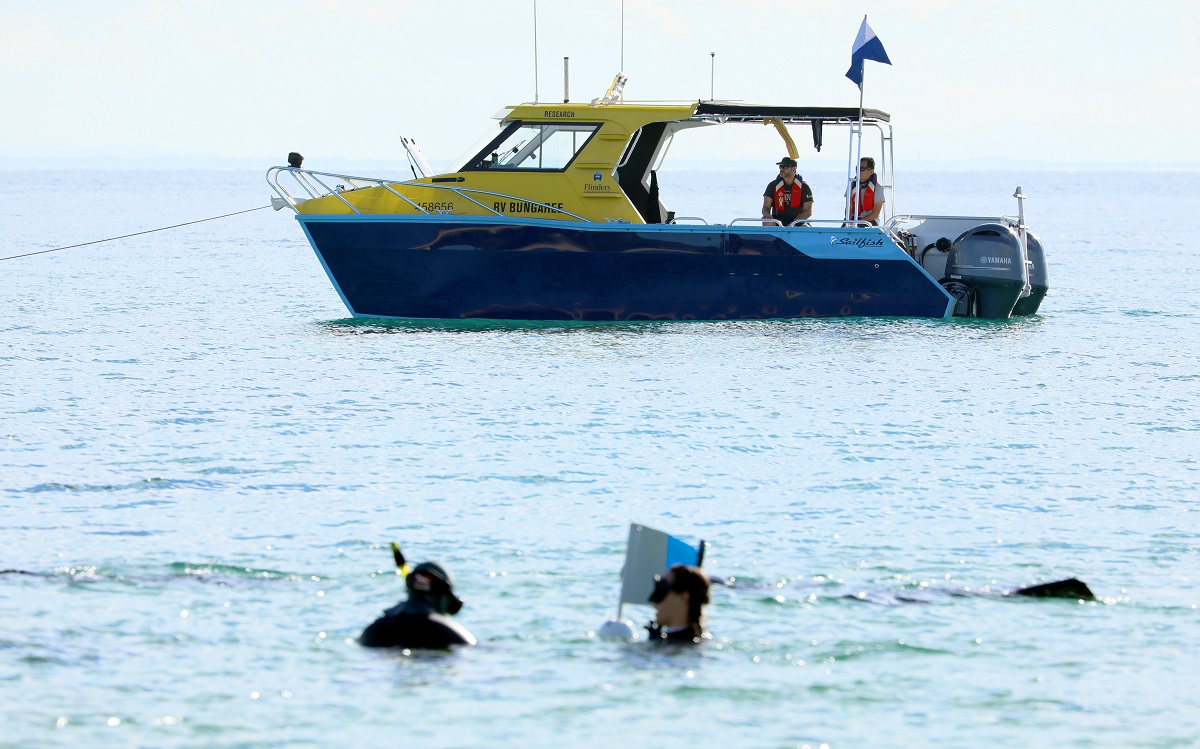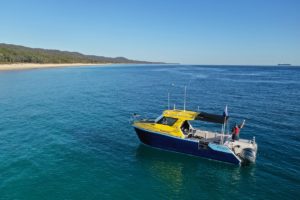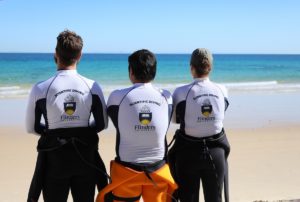
A new boat to be used by Flinders University Maritime Archaeology for scientific diving and marine geophysical surveys has been named in honour of Bungaree, a Kuringgai leader who was a key part of Matthew Flinders’ 1802 exploration party that circumnavigated Australia.
The dedicated maritime archaeology vessel, a modified Sailfish Canyonmaster XL 8m aluminium catamaran, has been named RV Bungaree to pay fitting tribute to a man who Flinders held in the highest regard.
Flinders University’s Pro Vice-Chancellor Indigenous, Associate Professor Simone Tur, says “naming the research vessel Bungaree acknowledges his pivotal role as part of the success of Flinders’ expedition and recognises Bungaree’s knowledge of Country. It has also been an honour to have descendants of Bungaree support the naming of the research vessel.”
Maritime Archaeology program coordinator, Associate Professor Jonathan Benjamin, says it’s appropriate that Flinders University’s vessel is named after the Indigenous explorer who travelled extensively by sea and circumnavigated Australia with Matthew Flinders.

“We felt it important that we acknowledge the under-represented Indigenous histories in maritime archaeology, and made sure to undertake responsible consultation process, seeking permission from the Gadigal community, including multiple direct descendants of Bungaree himself,” says Associate Professor Benjamin.
Along with Hiro Yoshida, Maritime Program Technical Officer and Lead SCUBA instructor, Associate Professor Benjamin and the maritime archaeology team received the vessel in June and put it through its initial bout of survey work off Moreton Island in Queensland during the Maritime Program’s annual major field school (ARCH 8152).
Flinders Maritime Archaeology has been further bolstered through joining the Australia/NZ Scientific Diving Association (ANZSDA) and became an Organizational Member of the American Academy of Underwater Sciences (AAUS). The program now offers a new Micro-credential in Scientific Diving that certifies students to meet both the Australian and American Standards for Professional Scientific Diver (MICR-PSDC).
“This is a huge advantage for our graduates who will now be able to leave their degree with an occupational diving qualification, recognised in Australia and internationally,” says Hiro Yoshida, who is the Lead SCUBA instructor of the program.
 Postgrad students can enrol for the micro-credential during their postgraduate studies and complete it via a workbook alongside either of the co-requisites Methods in UW Archaeology (ARCH8157) and Maritime Archaeology Field School (ARCH8152). Anyone interested in the diving micro-credential should contact diving@flinders.edu.au
Postgrad students can enrol for the micro-credential during their postgraduate studies and complete it via a workbook alongside either of the co-requisites Methods in UW Archaeology (ARCH8157) and Maritime Archaeology Field School (ARCH8152). Anyone interested in the diving micro-credential should contact diving@flinders.edu.au
Flinders University’s strengths in Archaeology recently saw the discipline areas ranked Top 50 in the world and Top 3 in Australia by the QS World University Rankings – and is the only Archaeology department in the global top 50 with a dedicated postgraduate degree in maritime archaeology.
Beyond acquiring the new research vessel RV Bungaree, Flinders has invested substantially in maritime archaeology in recent years, with research infrastructure funding for new Scubapro dive equipment, a new Bauer compressor, OTS Full Face Masks, sea-scooters and a new technical workshop managed by Yoshida. With two full-time maritime archaeology academic staff, a full-time tech officer and lead scuba instructor, the Masters program that was established in 2002 stands as the most successful program of its kind in Australia and the Southern Hemisphere.
Associate Professor Mark Staniforth, who initiated the course, remembers that Maritime Archaeology at Flinders University started with a single undergraduate topic in 1996, and student interest allowed the undergraduate offerings to expand steadily over the next five years. Graduate level teaching began in 2002 with joint Masters level teaching with James Cook University (Quuensland), the WA Museum (WA) and later the University of Ulster (Northern Ireland), enabling Flinders to expand to two academic positions in Maritime Archaeology in 2006.
“It has been exciting to watch the developments in Maritime Archaeology at Flinders University over the past decade, since I retired in 2010,” says Associate Professor Staniforth. “The current staff have been extremely successful in their research grants and projects and have greatly assisted Archaeology in raising its ranking in recent years. In particular, I have been impressed by the numbers of PhD graduates who are conducting interesting and cutting-edge research across a range of subjects. Some of our past PhDs have gone on to academic positions in the US (Nathan Richards) and Japan (Jun Kimura) and I expect some of the more recent PhD graduates will also make a difference to research and teaching in the field of Maritime Archaeology at an international level.”
“Through the past 20 years, we have been able to provide a unique balance between theoretical course content with a lot of practical work and training on survey sites,” says Associate Professor Wendy van Duivenvoorde, who laid a foundation as Maritime Archaeology Program Coordinator from 2013 to 2019.
“It means that our course graduates are workforce ready – especially with the addition of a scientific diving credential, which has set a valuable precedent in the Southern Hemisphere.”

